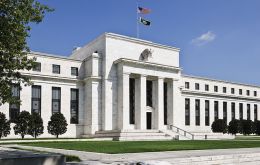MercoPress. South Atlantic News Agency
Economy
-
Saturday, April 11th 2020 - 10:18 UTC
YPF slashes oil production 50% as consumption slumps and depots are overflowing

Argentina’s state-held energy firm YPF slashed by 50% the oil production from its key development area in the vast Vaca Muerta shale play this week due to tumbling fuel demand in Argentina’s lockdown, local news outlet Rio Negro reports.
-
Friday, April 10th 2020 - 15:50 UTC
UN agencies call on governments to condone debts of the poorest countries

More than 60 U.N. agencies and international organizations urged governments on Thursday to take immediate steps to address the unfolding global recession and financial crisis wrought by the coronavirus pandemic, especially in the world’s poorest countries.
-
Friday, April 10th 2020 - 15:45 UTC
IMF sees emerging markets and low income nations as the most exposed to the coming recession

The International Monetary Fund sees the world economy suffering its worst recession since the Great Depression this year, with emerging markets and low-income nations in Africa, Latin America and Asia at particularly high risk.
-
Friday, April 10th 2020 - 15:37 UTC
Brazilian March inflation the lowest in 25 years, with several consumer items in deflation

Brazilian inflation slowed sharply in March, official figures showed on Thursday, falling to its lowest for that month in over quarter of a century as the new coronavirus crisis sapped demand for household goods and transport.
-
Friday, April 10th 2020 - 15:12 UTC
General Motors shut down factories in Brazil for at least 60 days

General Motors Co plans to keep its Brazilian factories shut down for at least 60 more days due to the coronavirus crisis, the company said on Thursday, as the final batch of unionized workers voted on the automaker's proposal.
-
Friday, April 10th 2020 - 14:50 UTC
US Fed and Bank of England ramp up emergency responses to the escalating recession in unchartered waters

The U.S. Federal Reserve and the Bank of England ramped up their emergency responses to the world's escalating coronavirus recession on Thursday as they pushed deeper into territory once considered fraught with risk for central bankers.
-
Friday, April 10th 2020 - 08:57 UTC
US, Russia and Saudis hammer out a tentative accord to cut oil supply and help boost prices

OPEC, Russia and other allies outlined plans on Thursday to cut their oil output by more than a fifth and said they expected the United States and other producers to join in their effort to prop up prices hammered by the coronavirus crisis.
-
Friday, April 10th 2020 - 08:56 UTC
Falklands' survey: 84% of businesses report negative impact from the pandemic

The Falkland Islands Government, FIG, recently carried out a business survey in conjunction with the Chamber of Commerce that resulted in 283 responses.
-
Friday, April 10th 2020 - 08:48 UTC
Falklands' wool farmers bashed with lack of demand and falling prices

Falkland Islands farmers are deeply concerned because wool prices have crashed to 40-50% below levels of early 2019, and as much as 70% of the Falklands 2019/20 wool clip is as yet unsold.
-
Thursday, April 9th 2020 - 14:57 UTC
Chilean consumer prices rose 0.3% in March, and 3.7% in twelve months

Chile consumer prices rose 0.3% in March, the government's statistics agency said on Wednesday, pushed upwards by a rise in food and education costs but counterbalanced by a fall in transportation prices.
